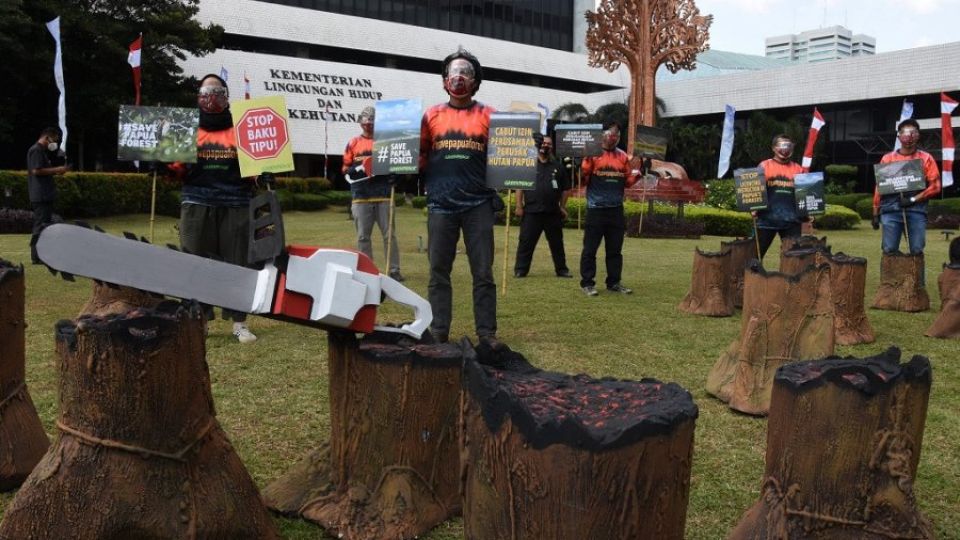June 20, 2023
JAKARTA – Environmentalists have warned that the 2024 election could well determine the fate of the country’s forests, citing previous spikes in deforestation after regime change alongside the fragility of the government’s environmental pledges and achievements.
Madani Foundation executive director Nadia Hadad said 2024 would be a crucial moment for Indonesia not only because of the presidential, legislative and regional elections but also because of the climate crisis and ongoing El Niño climactic phenomenon.
“We are currently facing a climate crisis that will be more worrying if we don’t do anything,”
“This is the moment to choose leaders who can implement environmental protection agendas against natural disasters and climate change that we are currently facing,” Nadia said in a discussion hosted by Madani on Thursday.
She added that the new government would need to follow through with the current administration’s environmental pledges, such as the 2030 Nationally Determined Contribution (NDC) to global emissions reduction and the 2060 net-zero goal outlined in the Long-Term Strategy for Low Carbon and Climate Resilience (LTS-LCCR).
However, the incoming government would also have to reconcile such environmental pledges with policies that ran counter to the spirit of environmental protection, such as the Job Creation Law.
Mufti Fathul Barri, executive director of Forest Watch Indonesia (FWI), expressed concern that deforestation tended to rise soon after regime change in Indonesia, based on data the FWI had gathered from the Environment and Forestry Ministry.
He pointed out that from 1996 to 2000, some 3.51 million hectares were deforested annually, according to government data. This period coincided with the transition from the New Order to the Reform Era.
However, even under the ostensibly more democratic Reform Era, the trend continued. From 2003 to 2006, which included the transition from president Megawati Soekarnoputri to president Susilo Bambang Yudhoyono (SBY), some 1.17 million ha were deforested in the country yearly.
Meanwhile, from 2014 to 2015, the start of President Joko “Jokowi” Widodo’s tenure in the nation’s highest office, the government recorded 1.09 million ha of deforestation per year.
Between 2020 and 2021, the government recorded 113,534 ha of deforestation, while in the previous period of 2019 to 2020 it was 115,459 ha, a sharp decrease from 2018 to 2019’s 462,400 ha.
As the election was scheduled for February 2024, Mufti said, November 2023 to January 2024 would be a crucial period, as forested areas could be traded as part of political dealings for the election, which could lead to deforestation.
“We hope the current Environment and Forestry Minister will not repeat the mistake of previous ministers who released forest areas moments before regime change,” Mufti said on Thursday.
Meanwhile Ferdian Yazid, program manager for natural resources and economic governance at Transparency International Indonesia, said that if voters wanted leaders who cared about the environment, voters’ involvement in politics should not stop at the ballot box.
Ferdian said Indonesian politics was not easily divided into left and right and defied common assumptions that the former would be pro-environment and the latter would be pro-market.
Instead, the country’s politics tended toward cartel dynamics, in which state offices were often used to gain power, he said.
Ferdinand said the people who financed politicians were just as important as the politicians themselves, especially as the rules of political party funding in Indonesia were not wholly transparent.
“A presidential candidate might claim to care about the environment, but when we track his financiers he [may well be] supported by those exploiting natural resources,” Ferdian said.
He also said that given the flexibility of political coalitions, even candidates who campaigned on pro-environment platforms could strike deals with their political opponents that compromised their environmental policies.
It was up to voters, he said, to keep watch on politicians to ensure they honored their political pledges after taking office.
“Otherwise, our votes and political participation stop at the ballot box,” Ferdian said.


